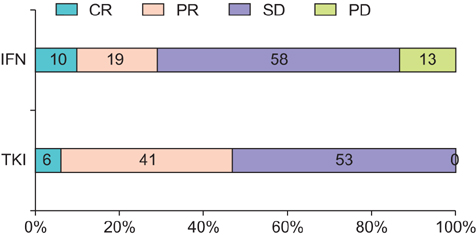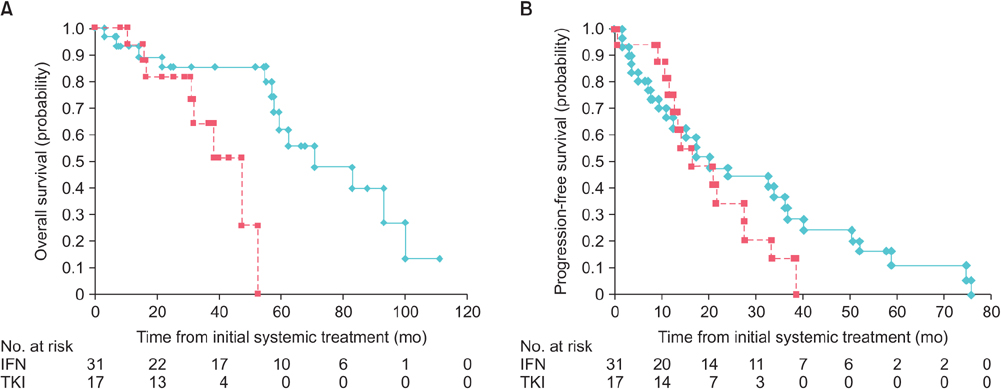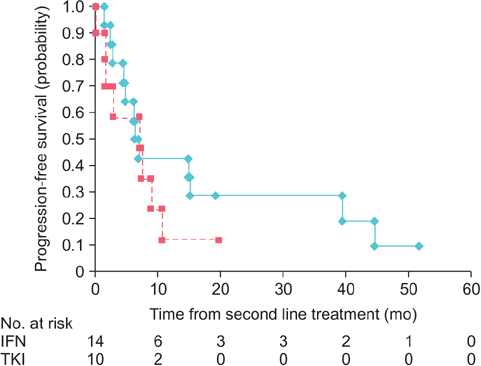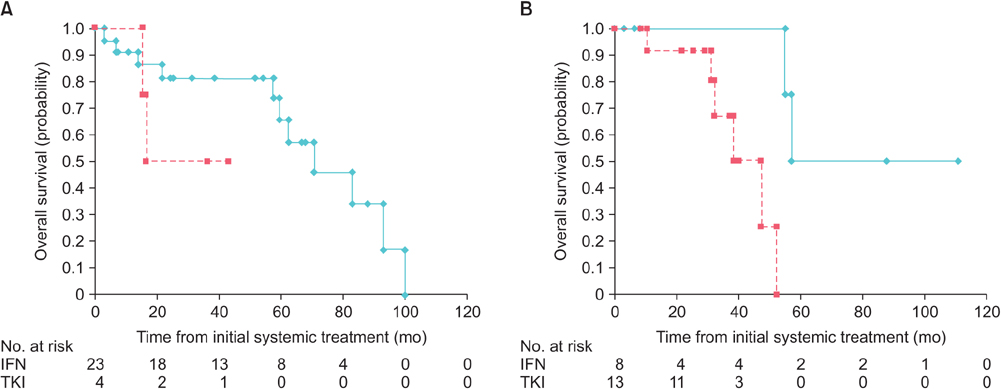Korean J Urol.
2015 Mar;56(3):205-211. 10.4111/kju.2015.56.3.205.
Interferon treatment for Japanese patients with favorable-risk metastatic renal cell carcinoma in the era of targeted therapy
- Affiliations
-
- 1Department of Urology, Graduate School of Medicine, Chiba University, Chiba, Japan. tomo1ata2@yahoo.co.jp
- 2Division of Urology, Chiba Cancer Center, Chiba, Japan.
- KMID: 2133288
- DOI: http://doi.org/10.4111/kju.2015.56.3.205
Abstract
- PURPOSE
Single-agent interferon (IFN) is no longer regarded as a standard option for first-line systemic treatment of metastatic renal cell carcinoma (RCC) in Western countries. However, some patients with favorable-risk RCC may still achieve complete and long-lasting remission in response to IFN treatment. The present study compared favorable-risk Japanese patients with metastatic RCC Japanese patients who had been treated with IFN or tyrosine kinase inhibitor (TKI) therapy as a first-line systemic therapy.
MATERIALS AND METHODS
From 1995 to 2014, a total of 48 patients with favorable risk as defined by the Memorial Sloan Kettering Cancer Center criteria who did not receive adjuvant systemic therapy were retrospectively enrolled in this study. We assessed the tumor response rate, progression-free survival (PFS), and overall survival (OS).
RESULTS
The objective response rate for first-line therapy was 29% in the IFN group and 47% in the TKI group, but this difference did not reach the level of statistical significance. Median OS for IFN and TKI was 71 and 47 months, respectively (p=0.014). Median first-line PFS for IFN and TKI was 20 and 16 months, respectively (no significant difference). First-line IFN therapy did not prove inferior to TKI therapy in terms of OS according to metastatic sites.
CONCLUSIONS
IFN is associated with a survival benefit in Japanese patients with favorable-risk metastatic RCC in the era of targeted therapy. Further prospective study is needed.
MeSH Terms
-
Adult
Aged
Antineoplastic Agents/*therapeutic use
Carcinoma, Renal Cell/*drug therapy
Disease-Free Survival
Female
Humans
Interferons/*therapeutic use
Japan
Kidney Neoplasms/*drug therapy
Male
Middle Aged
Neoplasm Metastasis/drug therapy
Protein Kinase Inhibitors/therapeutic use
Protein-Tyrosine Kinases/antagonists & inhibitors
Retrospective Studies
Risk Factors
Treatment Outcome
Antineoplastic Agents
Interferons
Protein Kinase Inhibitors
Protein-Tyrosine Kinases
Figure
Reference
-
1. Escudier B, Porta C, Schmidinger M, Algaba F, Patard JJ, Khoo V, et al. Renal cell carcinoma: ESMO Clinical Practice Guidelines for diagnosis, treatment and follow-up. Ann Oncol. 2014; 25:Suppl 3. iii49–iii56.2. Hutson TE, Quinn DI. Cytokine therapy: a standard of care for metastatic renal cell carcinoma? Clin Genitourin Cancer. 2005; 4:181–186.3. Naito S, Yamamoto N, Takayama T, Muramoto M, Shinohara N, Nishiyama K, et al. Prognosis of Japanese metastatic renal cell carcinoma patients in the cytokine era: a cooperative group report of 1463 patients. Eur Urol. 2010; 57:317–325.4. Klapper JA, Downey SG, Smith FO, Yang JC, Hughes MS, Kammula US, et al. High-dose interleukin-2 for the treatment of metastatic renal cell carcinoma: a retrospective analysis of response and survival in patients treated in the surgery branch at the National Cancer Institute between 1986 and 2006. Cancer. 2008; 113:293–301.5. Belldegrun AS, Klatte T, Shuch B, LaRochelle JC, Miller DC, Said JW, et al. Cancer-specific survival outcomes among patients treated during the cytokine era of kidney cancer (1989-2005): a benchmark for emerging targeted cancer therapies. Cancer. 2008; 113:2457–2463.6. Eto M, Kamba T, Miyake H, Fujisawa M, Kamai T, Uemura H, et al. STAT3 polymorphism can predict the response to interferon-α therapy in patients with metastatic renal cell carcinoma. Eur Urol. 2013; 63:745–752.7. Motzer RJ, Bacik J, Murphy BA, Russo P, Mazumdar M. Interferon-alfa as a comparative treatment for clinical trials of new therapies against advanced renal cell carcinoma. J Clin Oncol. 2002; 20:289–296.8. Motzer RJ, Michaelson MD, Redman BG, Hudes GR, Wilding G, Figlin RA, et al. Activity of SU11248, a multitargeted inhibitor of vascular endothelial growth factor receptor and plateletderived growth factor receptor, in patients with metastatic renal cell carcinoma. J Clin Oncol. 2006; 24:16–24.9. Motzer RJ, Rini BI, Bukowski RM, Curti BD, George DJ, Hudes GR, et al. Sunitinib in patients with metastatic renal cell carcinoma. JAMA. 2006; 295:2516–2524.10. Shinohara N, Abe T, Mochizuki T, Kashiwagi A, Kanagawa K, Maruyama S, et al. Is Memorial Sloan-Kettering Cancer Center risk classification appropriate for Japanese patients with metastatic renal cell carcinoma in the cytokine era. Urol Oncol. 2013; 31:1276–1282.11. Coppin C, Porzsolt F, Awa A, Kumpf J, Coldman A, Wilt T. Immunotherapy for advanced renal cell cancer. Cochrane Database Syst Rev. 2005; (1):CD001425.12. Medical Research Council Renal Cancer Collaborators. Interferon-alpha and survival in metastatic renal carcinoma: early results of a randomised controlled trial. Lancet. 1999; 353:14–17.13. Pyrhonen S, Salminen E, Ruutu M, Lehtonen T, Nurmi M, Tammela T, et al. Prospective randomized trial of interferon alfa-2a plus vinblastine versus vinblastine alone in patients with advanced renal cell cancer. J Clin Oncol. 1999; 17:2859–2867.14. Negrier S, Gomez F, Douillard JY, Ravaud A, Chevreau C, Buclon M, et al. Prognostic factors of response or failure of treatment in patients with metastatic renal carcinomas treated by cytokines: a report from the Groupe Français d'Immunothérapie. World J Urol. 2005; 23:161–165.15. Takeuchi A, Shiota M, Tatsugami K, Yokomizo A, Kuroiwa K, Dejima T, et al. YB-1 suppression induces STAT3 proteolysis and sensitizes renal cancer to interferon-α. Cancer Immunol Immunother. 2013; 62:517–527.16. Akaza H, Kawai K, Tsukamoto T, Fujioka T, Tomita Y, Kitamura T, et al. Successful outcomes using combination therapy of interleukin-2 and interferon-alpha for renal cell carcinoma patients with lung metastasis. Jpn J Clin Oncol. 2010; 40:684–689.17. Specific surveillance for Sunitinib of Japanese at final version (in Japanese) [Internet]. Tokyo: Pfizer Japan Inc.;c2015. cited 2012 Mar 15. Available from: http://pfizerpro.jp/cs/sv.18. Specific surveillance for Sunitinib of Japanese at final version (in Japanese) [Internet]. Tokyo: Bayer Yakuhin Ltd.;c2015. cited 2013 May 16. Available from: http://www.nexavar.jp/unmember/pdf/rcc201305.19. Keegan KA, Schupp CW, Chamie K, Hellenthal NJ, Evans CP, Koppie TM. Histopathology of surgically treated renal cell carcinoma: survival differences by subtype and stage. J Urol. 2012; 188:391–397.
- Full Text Links
- Actions
-
Cited
- CITED
-
- Close
- Share
- Similar articles
-
- Is Cytoreductive Nephrectomy Still Beneficial for Patients With Metastatic Renal Cell Carcinoma in the Contemporary Immunotherapy Era?
- Current Status of Targeted Therapy for Advanced Renal Cell Carcinoma
- Application of Autologous Tumor Vaccine as an Adjuvant Immunotherapy in the Treatment of Metastatic Renal Cell Carcinoma
- Targeted Therapy in Metastatic Renal Cell Carcinoma
- Perineal Metastatic Clear Cell Renal Cell Carcinoma: A Case Report





